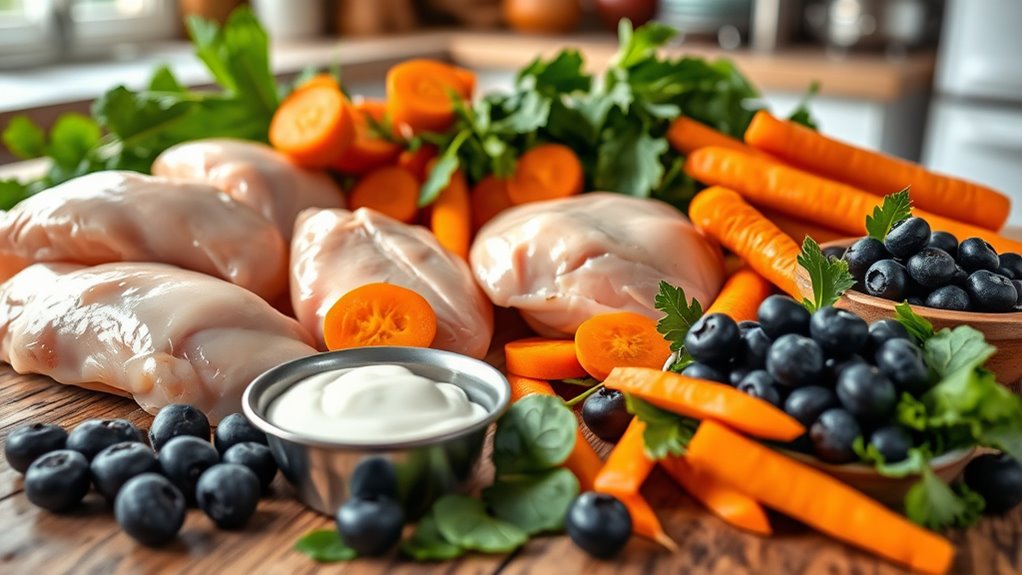When choosing natural pet food, look for high-quality ingredients like real meats such as chicken, turkey, or fish, along with vegetables like carrots and green beans. Whole grains like brown rice or oats also support your pet’s health. Avoid fillers such as corn, soy, artificial preservatives, and flavors. Ensuring the ingredients are fresh and natural helps your pet thrive. Keep exploring to discover more tips for selecting the best nutrition for your furry friend.
Key Takeaways
- Prioritize real meat, vegetables, and wholesome grains as primary ingredients.
- Avoid fillers like corn, soy, artificial preservatives, and artificial flavors.
- Look for labels indicating “complete and balanced” by reputable organizations like AAFCO.
- Check ingredient lists for high-quality protein sources at the top.
- Select formulas tailored to your pet’s age, breed, and health needs for optimal nutrition.

Have you ever wondered what’s really in your pet’s food? It’s a question many pet owners ask, especially when trying to choose the best diet for their furry friends. With so many options available, from commercial brands to homemade recipes, understanding what ingredients to look for can feel overwhelming. The key is to prioritize whole, natural ingredients that support your pet’s health and well-being. Commercial brands can vary widely in quality, so it’s essential to read labels carefully. Look for foods that list real meat, vegetables, and wholesome grains as primary ingredients. Avoid products filled with fillers like corn, soy, and artificial preservatives, which provide little nutritional value and can sometimes cause allergies or digestive issues.
If you’re inclined to prepare homemade recipes, you have the advantage of controlling exactly what goes into your pet’s bowl. Choosing fresh, high-quality ingredients ensures your pet gets the nutrients they need without unnecessary additives. When selecting ingredients for homemade meals, focus on lean meats like chicken, turkey, or fish, which serve as excellent protein sources. Incorporate vegetables such as carrots, green beans, and sweet potatoes for fiber and essential vitamins. Whole grains like brown rice or oats can add energy and help with digestion. Remember, it’s essential to do some research or consult a veterinarian to create a balanced diet that meets your pet’s specific needs. Homemade recipes allow you to avoid preservatives and artificial flavors, but they require careful planning to guarantee nutritional completeness.
Additionally, understanding the importance of scalp health and how certain ingredients like glycolic acid can benefit both human and pet skin may influence your choices for topical treatments or supplements for your furry friends. In contrast, commercial brands are formulated by experts to provide balanced nutrition, making them convenient for busy pet owners. When choosing a commercial product, look for those labeled “complete and balanced” by reputable organizations like AAFCO. Always check the ingredient list to ensure that high-quality protein sources are listed at the top, and steer clear of foods with vague terms like “meat by-products” or “meal.” It’s also beneficial to consider your pet’s age, breed, and health conditions when selecting a brand, as different formulas cater to specific needs. Whether opting for homemade recipes or commercial brands, the goal is to provide ingredients that promote your pet’s longevity, vitality, and happiness. Being informed about what’s in your pet’s food empowers you to make better choices, guaranteeing your furry friend enjoys a nutritious, satisfying diet every day.
Frequently Asked Questions
Are Synthetic Preservatives Safe for Pets?
Synthetic preservatives aren’t the best choice for your pet’s health. They can cause allergies or other health issues over time. You should look for natural preservatives, like vitamin E or C, which are safer and support overall well-being. By avoiding synthetic preservatives, you’re helping protect your pet from potential health risks and ensuring they stay healthier and happier with a diet that’s gentle and natural.
How Do Natural Ingredients Affect Pet Allergies?
Natural ingredients can help reduce pet allergies, especially if your pet has grain sensitivities, by avoiding common allergens like artificial additives. When you choose foods with transparent ingredients, you’ll better understand what’s in their bowl, making it easier to identify and eliminate potential triggers. This approach supports healthier digestion and less allergic reactions, giving your pet a more comfortable life. Always check ingredient labels for clarity and avoid unnecessary fillers.
Can Natural Pet Food Meet All Nutritional Needs?
You can trust natural pet food to meet all nutritional needs when it’s formulated correctly. For example, a dog with sensitivities thrived on a balanced, holistic nutrition diet emphasizing quality ingredient sourcing. By choosing brands that prioritize complete formulas, you guarantee your pet gets essential vitamins, minerals, and nutrients. Always check labels and consult your vet, but quality natural pet foods are designed to support your pet’s overall health and well-being.
What Are the Signs of Poor-Quality Natural Pet Food?
You’ll notice poor-quality natural pet food if it has inconsistent ingredient sourcing, like questionable or vague labels. Look out for manufacturing standards that aren’t transparent, which can lead to contamination or nutrient loss. Signs include a strong odor, dull appearance, or excessive fillers. If the food seems overly processed or poorly labeled, it’s a red flag. Always choose brands that prioritize high-quality sourcing and strict manufacturing standards for your pet’s health.
Is Grain-Free Always Better for Pets?
Did you know that grain-free diets can improve pet digestion in up to 80% of cases? While grain-free benefits vary, they often help pets with allergies or sensitivities. However, it’s not always better—some pets do well with grains. You should consider your pet’s specific needs and consult your vet, but generally, grain-free options may support better digestion and reduce allergy symptoms for many pets.
Conclusion
Choosing the right natural pet food is like planting seeds for a healthier, happier life for your furry friend. Focus on ingredients that nourish and sustain, avoiding anything artificial. After all, isn’t your pet worth the best nature has to offer? By reading labels carefully, you’re giving them a gift more valuable than gold—vitality and love. Make every meal a step toward a vibrant, joyful life together.








